this class describes a complex More...
#include <CORE_Complex.h>
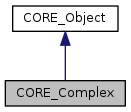
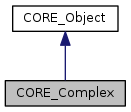
Public Member Functions | |
| void | setComplex (const tComplex &r) |
| set the real to r More... | |
| tComplex | getComplex () const |
| get the real More... | |
| tString | toString () const |
| return the string associated to the real More... | |
| void | getSharedPointer (SP::CORE_Object &p) |
| get the shared pointer of this class into p More... | |
| void | getSharedPointer (SPC::CORE_Object &p) const |
| get the shared pointer of this class into p More... | |
| tString | getClassName () const |
| return the class name of the object More... | |
| tString | getIdentityString () const |
| return the identity string of the object of the form className_at_address More... | |
| tString | getPointerAddress () const |
| return the identity string of the object More... | |
| template<class T > | |
| tBoolean | isInstanceOf () const |
| return true if the object is an instance of T More... | |
| virtual void | print () |
| print the class More... | |
| virtual ostream & | print (ostream &out) const |
| print the class More... | |
| virtual void | print (const tString &message) |
| print the class More... | |
| virtual void | print (const tInteger &str) |
| print More... | |
| virtual void | print (const tRelativeInteger &str) |
| print More... | |
| virtual void | print (const tReal &str) |
| print More... | |
| virtual void | print (const int &str) |
| print More... | |
Static Public Member Functions | |
| static SP::CORE_Complex | New () |
| build a complex object More... | |
| static SP::CORE_Complex | New (const tComplex &r) |
| build a complex object More... | |
| static tString | toString (tComplex i) |
| return the string associated to the real More... | |
| static tString | toString (complex< double > i, int s) |
| return the string associated to the real More... | |
| static tString | toString (complex< long double > i, int s) |
| return the string associated to the real More... | |
| static tComplex | parseComplex (tString str) |
| return the complex associated to the string More... | |
| static tString | getClassName (const tString &identityString) |
| return the class name of the object using only the identity string More... | |
| template<class T > | |
| static tString | getTypeName () |
| get type name More... | |
| static tBoolean | is64Architecture () |
| return true if the machine is a 64 bits machine More... | |
| static tBoolean | is32Architecture () |
| return true if the machine is a 32 bits machine More... | |
| static tString | pointer2String (const void *obj) |
| return the string represantation of a pointer More... | |
| static void | setOutput (ostream &out) |
| set output More... | |
| static ostream & | getOutput () |
| get output More... | |
| static void | printObjectsInMemory () |
| print object in memory More... | |
| static ostream & | print (ostream &out, const tString &message) |
| print the class More... | |
| static void | outputPrint (const tString &message) |
Static Public Attributes | |
| static const tComplex | C_I =tComplex(0,1) |
| describe the i complex More... | |
| static tBoolean | mIsMemoryTesting =false |
| indicator to store all classes created and deleted only for debuging version More... | |
Protected Member Functions | |
| CORE_Complex () | |
| create a complex More... | |
| CORE_Complex (const tComplex &i) | |
| create a complex initialize to i More... | |
| ~CORE_Complex () | |
| remove More... | |
| void | setThis (SP::CORE_Object p) |
| set this weak shared pointer called toDoAfterThis setting method More... | |
| virtual void | setType (tString type) |
| set the type of the object More... | |
| virtual void | toDoAfterThisSetting () |
| method called after setThis() method this method can oly be called once. More... | |
Detailed Description
this class describes a complex
Attributes:
- C_I is the complex i
- card: 1
- type: static complex
- mComplex is the internal representation complex of the class
- card: 1 -type: complex
- Version
- 1.0
Constructor & Destructor Documentation
|
protected |
|
protected |
create a complex initialize to i
|
protected |
remove
Member Function Documentation
return the class name of the object using only the identity string
Referenced by CORE_Object::printObjectsInMemory().

|
inherited |
return the class name of the object
- Returns
- the class name of the object
References tString.
Referenced by CORE_Object::getIdentityString().
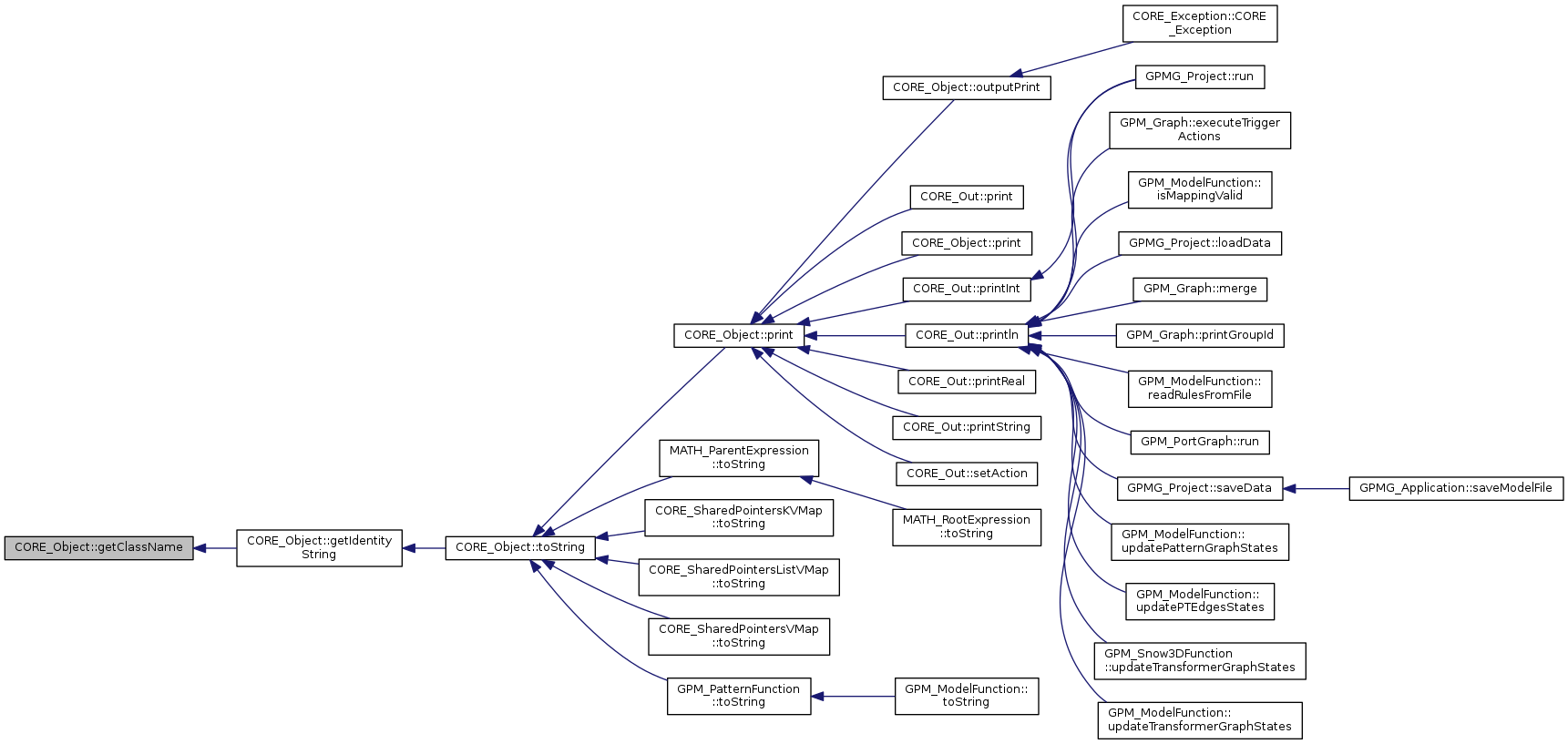
|
inline |
get the real
- Returns
- the complex value.
|
inlineinherited |
return the identity string of the object of the form className_at_address
- Returns
- the identity string of the object
References CORE_Object::getClassName(), CORE_Object::pointer2String(), and tString.
Referenced by CORE_Object::toString().

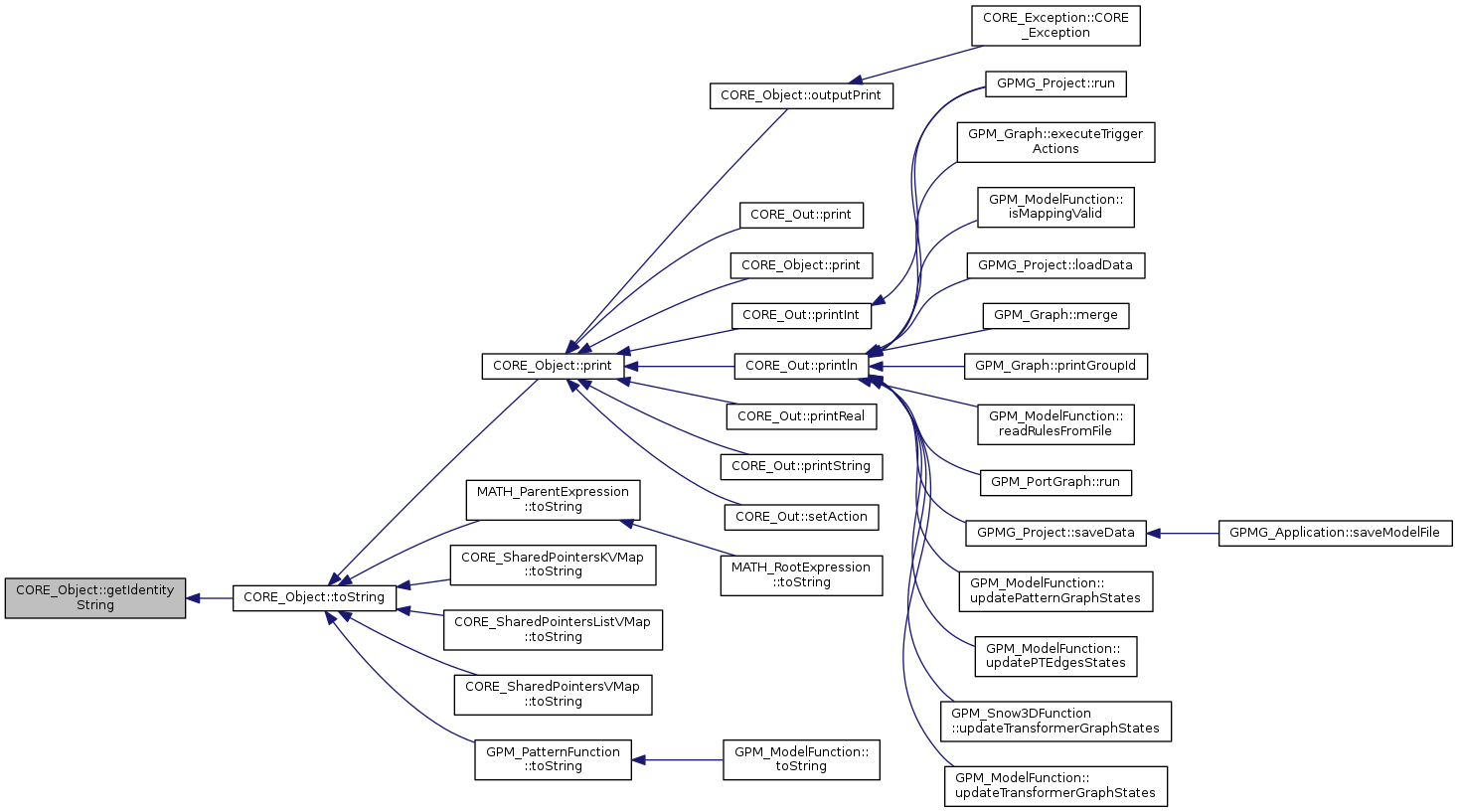
|
inlinestaticinherited |
get output
|
inlineinherited |
return the identity string of the object
- Returns
- the identity string of the object
References CORE_Object::pointer2String().

|
inlineinherited |
get the shared pointer of this class into p
Referenced by MATH_ParentExpression::addArgument(), GPMG_EnvironmentPanel::componentClicked(), GPM_GraphElement::copy(), CORE_Map< Key, Value >::getSharedPointer(), CORE_Array< T >::getSharedPointer(), CORE_Vector< T >::getSharedPointer(), CORE_Matrix< T >::getSharedPointer(), CORE_Object::printObjectsInMemory(), MATH_ParentExpression::setArgument(), GPMG_EnvironmentPanel::setEnvironment(), GPM_GraphElement::setGraph(), GPMG_GraphElementWindow::setGraphElement(), GPMG_ShowGraphDrawPanel::showGraph(), and GPMG_RuleGraphDrawPanel::showRule().
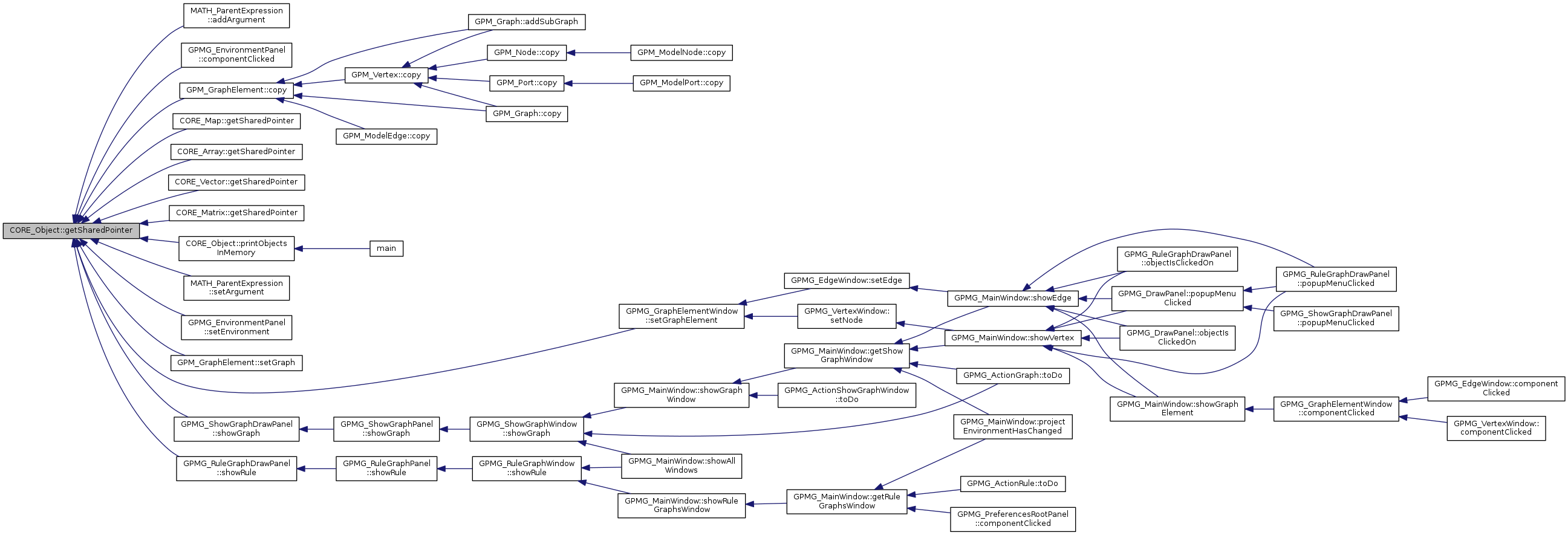
|
inlineinherited |
get the shared pointer of this class into p
|
inlinestaticinherited |
get type name
References tString.
|
inlinestaticinherited |
return true if the machine is a 32 bits machine
References CORE_Object::is64Architecture().

|
staticinherited |
return true if the machine is a 64 bits machine
Referenced by CORE_Object::is32Architecture().

|
inlineinherited |
return true if the object is an instance of T
References null.
Referenced by MATH_BinaryOperator::insertInTree(), MATH_UnaryOperator::insertInTree(), and MATH_EndBlock::insertInTree().
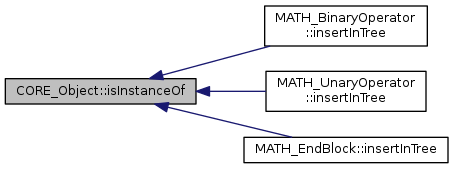
|
inlinestatic |
|
inlinestatic |
|
staticinherited |
print on output
References null, and CORE_Object::print().
Referenced by CORE_Exception::CORE_Exception().


return the complex associated to the string
References CORE_Real::parseReal(), tComplex, tReal, and tString.
Referenced by CORE_String::parse().


|
staticinherited |
return the string represantation of a pointer
References tString.
Referenced by CORE_Object::CORE_Object(), CORE_Object::getIdentityString(), CORE_Object::getPointerAddress(), and CORE_Object::~CORE_Object().
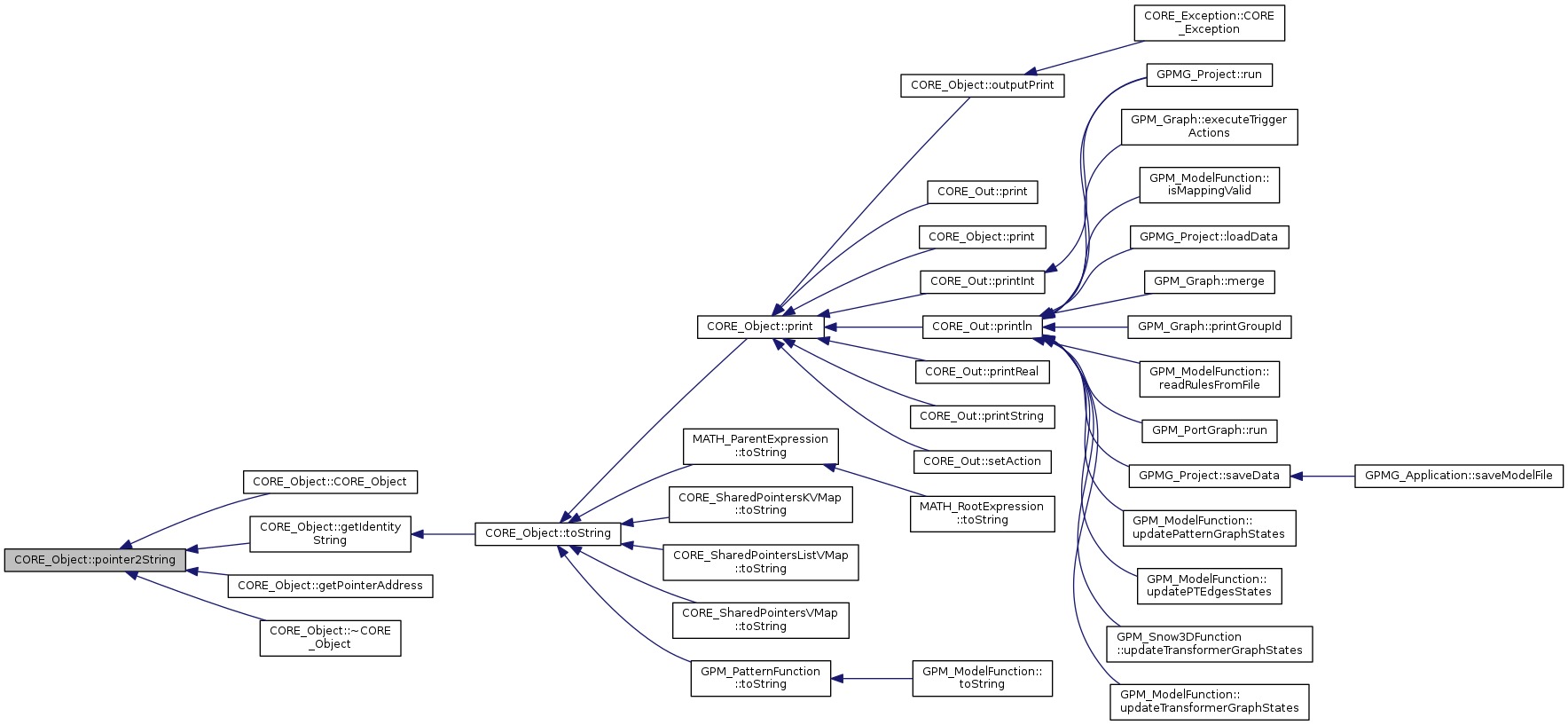
|
inlinevirtualinherited |
print the class
References CORE_Object::toString().
Referenced by CORE_Object::outputPrint(), CORE_Out::print(), CORE_Object::print(), CORE_Out::printInt(), CORE_Out::println(), CORE_Out::printReal(), CORE_Out::printString(), and CORE_Out::setAction().

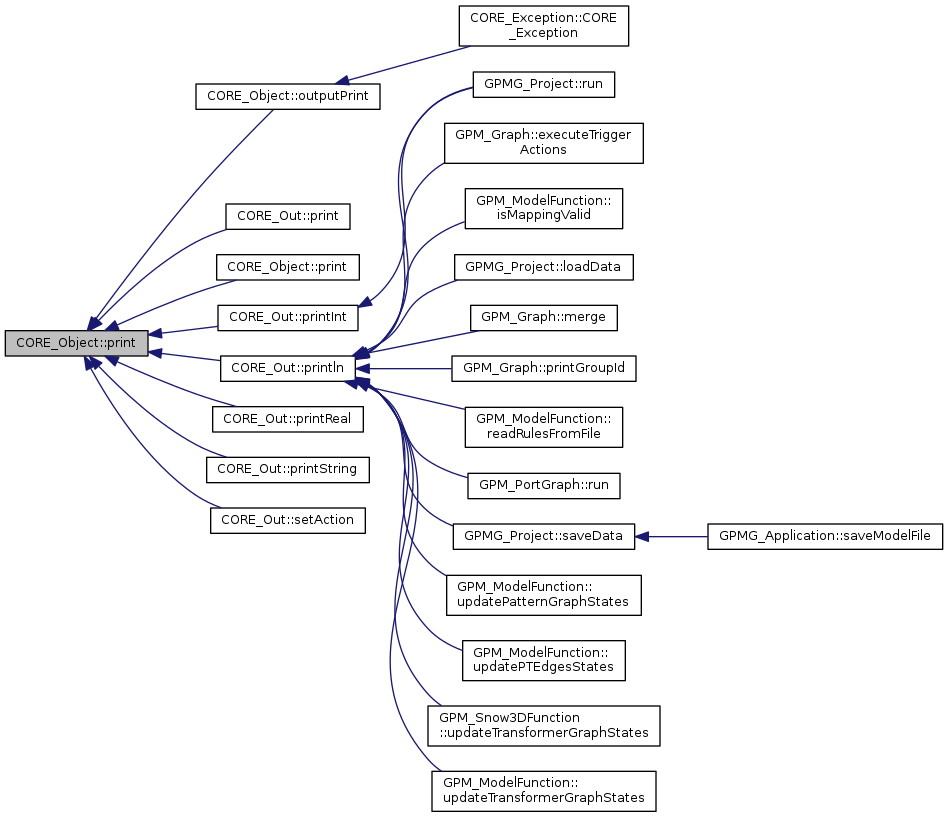
|
inlinevirtualinherited |
print the class
References CORE_Object::print(), and CORE_Object::toString().

|
virtualinherited |
print the class
Reimplemented in CORE_Out.
References null, and CORE_Object::print().

|
virtualinherited |
References null.
|
virtualinherited |
References null.
|
inlinestaticinherited |
print the class
|
staticinherited |
print object in memory
References CORE_Object::getClassName(), CORE_Object::getSharedPointer(), and CORE_Object::mIsMemoryTesting.
Referenced by main().


|
inline |
set the real to r
|
inlinestaticinherited |
set output
|
inlineprotectedinherited |
set this weak shared pointer called toDoAfterThis setting method
References CORE_Object::toDoAfterThisSetting().

|
inlineprotectedvirtualinherited |
set the type of the object
Referenced by CORE_CommandLine::CORE_CommandLine(), CORE_IO::CORE_IO(), GPM_2DSnowGraph::GPM_2DSnowGraph(), GPM_BGLTest::GPM_BGLTest(), GPM_ClassFactory::GPM_ClassFactory(), GPM_ConwayFunction::GPM_ConwayFunction(), GPM_ConwayGraph::GPM_ConwayGraph(), GPM_CoreRun::GPM_CoreRun(), GPM_CoreTest::GPM_CoreTest(), GPM_Edge::GPM_Edge(), GPM_ExamplesRun::GPM_ExamplesRun(), GPM_Function::GPM_Function(), GPM_Graph::GPM_Graph(), GPM_GraphElement::GPM_GraphElement(), GPM_ModelGraph::GPM_ModelGraph(), GPM_Node::GPM_Node(), GPM_Object::GPM_Object(), GPM_PatternFunction::GPM_PatternFunction(), GPM_Port::GPM_Port(), GPM_PortGraph::GPM_PortGraph(), GPM_Snow2DFunction::GPM_Snow2DFunction(), GPM_Snow3DFunction::GPM_Snow3DFunction(), GPM_Vertex::GPM_Vertex(), and MATH_ExpressionRun::MATH_ExpressionRun().
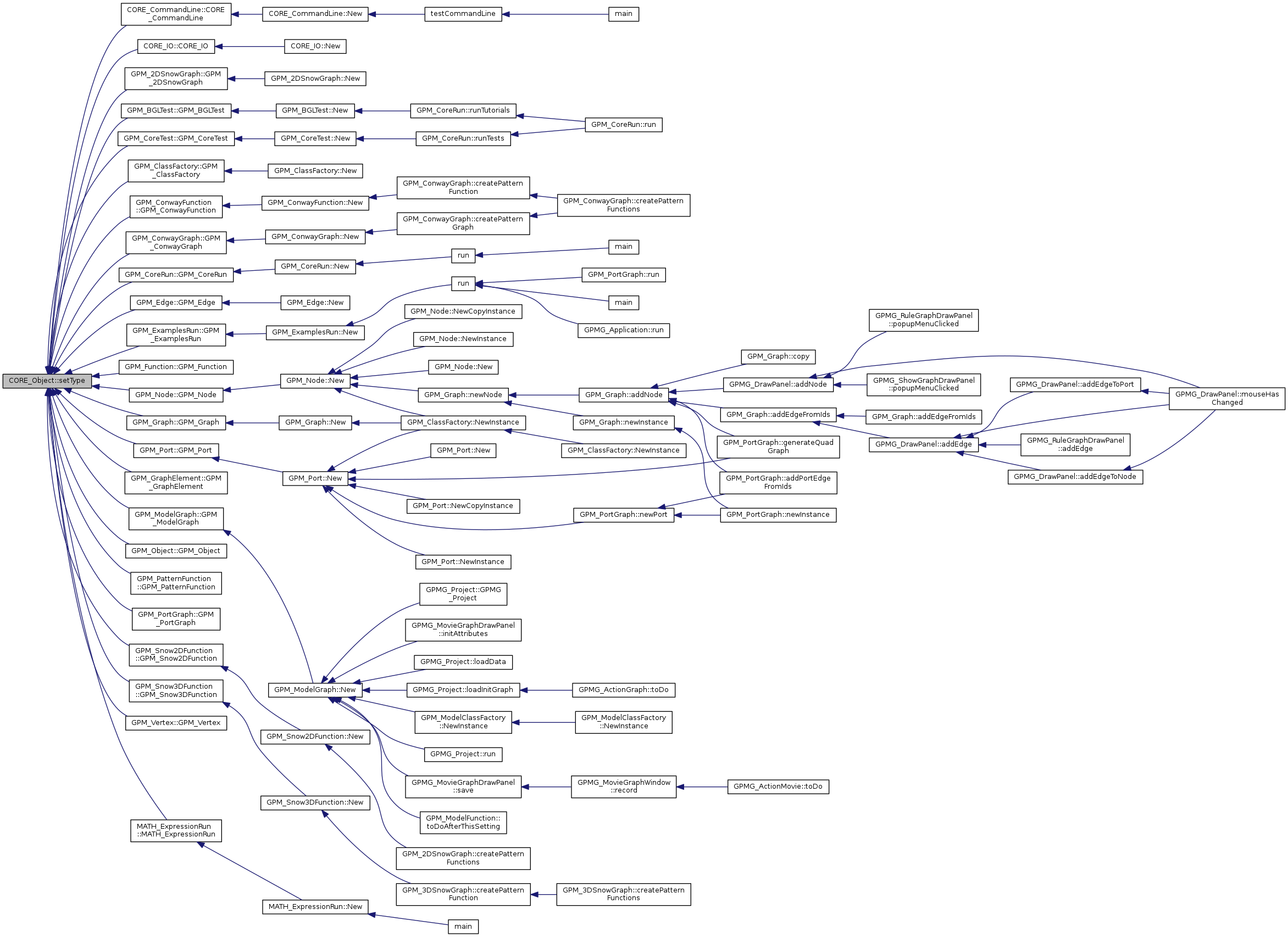
|
inlineprotectedvirtualinherited |
method called after setThis() method this method can oly be called once.
Reimplemented in GPM_2DSnowGraph, GPMG_EnvironmentWindow, GPM_GraphElement, GPM_ModelFunction, GPM_ModelGraph, GPMG_RuleGraphWindow, GPMG_MovieGraphWindow, GPMG_ShowGraphWindow, and GPM_Function.
Referenced by CORE_Object::setThis(), GPM_ModelGraph::toDoAfterThisSetting(), GPM_GraphElement::toDoAfterThisSetting(), and GPM_2DSnowGraph::toDoAfterThisSetting().
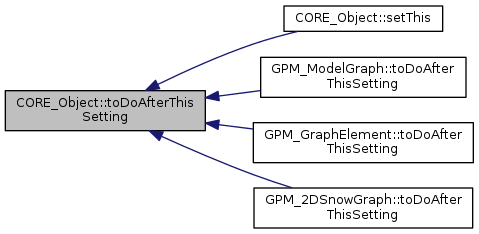
|
inlinevirtual |
return the string associated to the real
- Returns
- the string associated to the real
Reimplemented from CORE_Object.
References toString().
Referenced by toString(), and CORE_String::toString().


return the string associated to the real
- Returns
- the string associated to the real
References toString().

|
static |
return the string associated to the real
- Returns
- the string associated to the real
References CORE_Real::toString(), and tString.

|
static |
return the string associated to the real
- Returns
- the string associated to the real
References CORE_Real::toString(), and tString.

Member Data Documentation
|
staticinherited |
indicator to store all classes created and deleted only for debuging version
Referenced by CORE_Object::CORE_Object(), main(), CORE_Object::printObjectsInMemory(), and CORE_Object::~CORE_Object().
The documentation for this class was generated from the following files:



 1.8.8
1.8.8